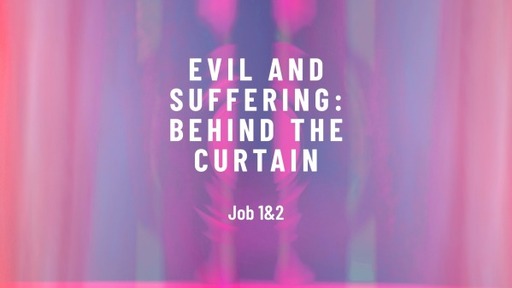Behind the Curtain

Notes
Transcript
Last week: sin causes suffering.
Last week: sin causes suffering.
This was a major, if not THE major takeway from last week. Because of the sin of humanity, starting with Adam & Eve, suffering, unbearable pain, and evil is part of our world.
The Bible does not teach Karma.
The Bible does not teach Karma.
In a concept very similar, from what I can tell, to Karma the ancient and present world believes if something bad happens then it must be the result of something you have done. The Israelites fell into this thought pattern by emphasizing God’s justice: good people prosper, bad people suffer.
The Bible holds God’s justice in line with God’s grace.
The Bible holds God’s justice in line with God’s grace.
God is perfectly all of his traits. Not one of his traits is greater than the other. When we highlight one trait over another we fall into this same pattern as the Israelites did. This is one reason why we need to read the OT and learn from them.
In suffering we must remember God’s wisdom.
In suffering we must remember God’s wisdom.
This is an important reminder. We do not know all things nor will we know all things.
Sin is not the only cause of suffering.
Sin is not the only cause of suffering.
We need to understand this. It is easy to understand Biblically the concept of sin and conclude that if something is wrong with another individual then they must “have done something”.
Sometimes, our blessing is the cause of our suffering.
Sometimes, our blessing is the cause of our suffering.
Interesting that it is because of Job’s blessings from God and from God pronouncing a blessing on him that the Accuser uses to be the point of suffering.
Suffering MAY be caused by the supernatural.
Suffering MAY be caused by the supernatural.
Job never gets this scene. Would it have helped? I’m not so certain. The Accuser, which Satan is the chief but not the only one, challenges not so much who Job is but who God is. However notice what is used, humans and natural disasters.
Is faith that is never tried, really faith?
Is faith that is never tried, really faith?
This is the question of Job to some extent. God, the Challenger, do not seem to have any joy in what happens but instead this question is put to God. If life is always good is there true faith?
Job proclaims: God can be trusted!
Job proclaims: God can be trusted!
No not in these exact words and I realize I may be interpreting things too heavily. Yet, he does state in 2.10 that we can accept and trust God not just because of good but also bad.
Our task: notice the pain and suffering in others.
Our task: notice the pain and suffering in others.
This is where Job’s friends got it right! We can forget this step as we try to rescue others. The old saying, “people don’t care how much you know until they know how much you care” is absolutely true.
Our hope: our Redeemer lives!
Our hope: our Redeemer lives!
Where does your hope come from? Pain and suffering will reveal our hope, or lack thereof. Though I don’t believe Job knew the extent of what he would proclaim later on, as if we ever really know, he makes this bold statement
I know that my redeemer lives,
and that in the end he will stand on the earth.
And after my skin has been destroyed,
yet in my flesh I will see God;
In the end we will see God!
In the end we will see God!
All will Scripture states. The glory of Scripture is that God is never classified as being dead or uninterested. As we grapple with the problem of suffering and evil we are reminded that we have this hope: Christ overcame the world and all its troubles. He alone conquered the greatest suffering and evil: death. And this day, he is alive and well.
